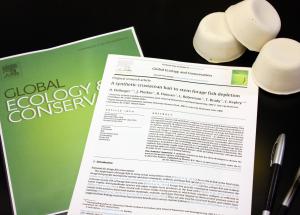Kepley BioSystem's Research Published in Global Ecology & Conservation
With continued support from field-testers, regulatory authorities, & agencies like the NSF, OrganoBait will offer meaningful, ecological solutions for the challenges associated with crustacean fishing
GREENSBORO, NORTH CAROLINA, U.S.A., August 2, 2016 /EINPresswire.com/ -- Kepley BioSystems (KBI) would like to express its appreciation to the scientific editors and reviewers of the journal of Global Ecology and Conservation (GECCO) for their acceptance and publication of KBI’s synthetic crustacean bait research and findings. The article, A synthetic crustacean bait to stem forage fish depletion, describes the company’s National Science Foundation (NSF) supported work on the characterization of a synthetic bait with the potential to obviate the need for up to 18 billion tons of forage fish stocks now annually caught and used as bait in crab and lobster traps. — Dr. Anthony Dellinger
KBI research has been centered on forage fish: several species of small schooling fish that are typically caught in seine nets and consumed in a variety of industrial applications driven by increasing demands from every continent. Forage fish provide key components of aquaculture and agricultural feed, pet food, commercial fish bait, and omega-3 supplements and cosmetics. These fish are also a primary food source for marine mammals, seabirds, and larger fish, as well as for human consumption, especially in developing countries. With such mounting stresses, the global forage fish biomass is facing imminent collapse if steps are not taken to prevent it.
“We are proud to share our work with the scientific community through GECCO,” says KBI president, Dr. Anthony Dellinger. “We believe our focus on conservation aligns closely with theirs. Few seem to understand the importance of forage fish to oceanic ecosystems and how current practices are unsustainable, in addition to the collateral damage from net fishing. Our development efforts can revolutionize the fishing industry worldwide, as well as aid in the restoration of the ocean’s most vital species of forage fish,” he continued.
Kepley has specifically targeted their efforts on the one-third of all captured forage fish that are returned to the ocean merely as bait to catch other more lucrative fish, such as crab and lobster, each year. A synthetic solution called Organobait ™, being developed by KBI through NSF support, would potentially alleviate the mounting pressure on forage fish stocks by offering an environmentally friendly, readily available and convenient alternative to commercial fisheries.
“Our disruptive technology can help replenish vast ecosystems and enhance global food security by harnessing exactly the same molecules that attract crustaceans in the wild as an alternative to the feckless destruction of one species to catch another,” says Terry Brady, Chief Inventor at Kepley BioSystems. Terry envisioned ways to synthetically mimic nature in order to preserve it while walking on Shoal Bay in Anguilla.
Professor Christopher Kepley, Founder of Kepley BioSystems and tenured professor at the Joint School of Nanoscience and Nanoengineering, added, “An alternative and sustainable bait that improves fishing outcomes and alleviates overfishing will improve oceanic homeostasis.”
“With continued support from field-testers, regulatory authorities, and agencies like the NSF, OrganoBait will offer meaningful, ecological solutions for the challenges associated with crustacean fishing,” says Dellinger. “It also promises to provide a pragmatic solution for an industry that is facing bait (fish) supply unpredictability, extreme limitations and escalating costs,” he concluded.
The publication will be available as part of the Global Ecology and Conservation catalogue to be distributed internationally. The article and additional information can be reached at http://www.sciencedirect.com/science/article/pii/S2351989416300555.
About Global Ecology and Conservation
Global Ecology and Conservation (GECCO) is a peer-reviewed, open-access journal covering all sub-disciplines of ecological and conservation science: from theory to practice, from molecules to ecosystems, from regional to global. The fields covered include: organismal, population, community, and ecosystem ecology; physiological, evolutionary, and behavioral ecology; and conservation science.
The aim of GECCO is to publish sound science in the form of research articles, case studies, reviews, and short communications of interest to researchers and professionals within these fields. For more information, visit http://www.journals.elsevier.com/global-ecology-and-conservation
About Kepley BioSystems
Kepley BioSystems originated at the Joint School of Nanoscience and Nanoengineering (JSNN), North Carolina A&T State University and The University of North Carolina at Greensboro; the company is now located at the Gateway University Research Park proximal to JSNN. Kepley BioSystems is an academically-driven company led by Professor Christopher Kepley and Dr. Anthony Dellinger, a recent graduate, working in collaboration with lead inventor Terry E. Brady, located on the Caribbean island of Anguilla, British West Indies.
For more information, visit: http://www.kepleybiosystems.com
Follow us on Facebook: https://www.facebook.com/kepleybiosystems/
Tweet us on Twitter: https://twitter.com/organobait
OrganoBait ™ is a registered trademark of Kepley BioSystems Incorporated, Greensboro, North Carolina
Anthony L. Dellinger, PhD
Kepley BioSystems Inc
336-217-5163
email us here
Legal Disclaimer:
EIN Presswire provides this news content "as is" without warranty of any kind. We do not accept any responsibility or liability for the accuracy, content, images, videos, licenses, completeness, legality, or reliability of the information contained in this article. If you have any complaints or copyright issues related to this article, kindly contact the author above.

